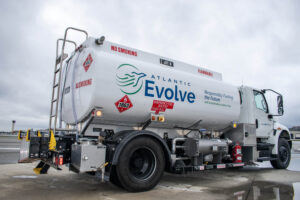As the world tries to decrease atmospheric carbonization, industries of every sort are joining the charge. Aviation is no exception. Though making a contribution to carbon drawdown involves a long chain of concerns, in aviation there is no shortage of resolute professionals working to make a difference. One such conglomeration of interests in southern California recently announced a partnership around decarbonization at Long Beach Airport (LGB).
“In December 2023, Long Beach Airport proudly announced the availability of sustainable aviation fuel for use by general aviation jets,” says Kate Kuykendall, public affairs officer for LGB.
Located only 20 miles (32km) from the much larger Los Angeles International Airport (LAX), LGB serves greater Los Angeles primarily as a domestic commercial, cargo, military, and general aviation airport.
Listed as the tenth busiest airport in California based on 1.4 million annual passenger boardings, the airport’s proximity to many residential areas has led to one of the strictest noise ordinances in the USA. “LGB is in a dense urban area where noise and other environmental impacts are a pressing concern for the local community. Sustainable aviation fuel is an eco-friendly alternative to standard jet fuel now offered at LGB through Atlantic Aviation, one of two FBOs at the airport.”
Atlantic Aviation is an aviation infrastructure operator providing services at more than 100 US airports including Long Beach. Established in 1927, Atlantic sees itself as an environmentally advanced, multi-billion dollar legacy business rather than an FBO. Eric Newman, vice president of commercial strategy and sustainability at Atlantic, shares that Sustainable aviation fuel (SAF) is a critical cog in Atlantic’s drive to decrease the carbon intensity of its operations.
“Atlantic is expanding the availability of SAF by making it easier for customers to access and purchase. We recently started ongoing SAF supply at LGB,” says Newman. “We receive weekly deliveries of blended SAF and are selling that product via Book and Claim to buyers across our expansive network.”
Objectively, the switch from standard jet fuel to SAF is imperative, but logistically, the reality is a little more complicated. The need to decarbonize fuels is not just an aviation problem.
Decarbonization is a global transportation issue that will take time and new production facilities to resolve. While incentives in California that make SAF more cost-effective have enabled this early growth, fully replacing standard jet fuel with SAF remains a more distant prospect on the horizon.
Newman is joined in illuminating the intricacies of SAF by his counterpart at aviation fuel supplier World Energy, Adam Klauber, vice president of sustainability and digital supply chain. Boston,
USA-based World Energy, the world’s first commercial scale SAF producer, turns renewable and waste resources into combustible fuel. Klauber begins by explaining how SAF is produced and its existing limitations.
“To produce SAF, World Energy buys sustainable feedstock in several forms primarily from partners in the USA,” says Klauber of SAF’s beginning-of-life process. He adds that the present challenge in producing SAF is the high costs.
“Unblended SAF can cost more than double conventional jet fuel and airlines have a limited ability to pay. This creates a chicken-or-egg situation.
“SAF is cost-prohibitive because there is a limited production capacity because it is expensive. We work with downstream partners like Atlantic to build trusted digital credit systems that expand the customer pool to companies and individuals who can pay the premium. Unlocking this requires a traceable and verified registry system.”
Though the oils used to make SAF can derive from many feedstocks, World Energy has primarily used tallow rendered from the fat of commercial beef. This year they will begin to use a crop called Carinata, which has typically been grown to slow soil erosion and enhance soil fertility. In sourcing beneficially regenerative raw materials, SAF decreases carbon emissions over the lifecycle of the fuel. Since SAF burns cleanly, it contributes positively to local ecosystems and human health.
“We expect major growth through the use of cover crops, and we will start using used cooking oil soon too,” continues Klauber. “World Energy’s Paramount refinery is just six miles from the Long Beach Airport. The proximity from production to aircraft is important because trucking the fuel any significant distance decreases the positive emissions value of SAF, which is where the savings are.”
The SAF that is delivered to Atlantic at the Long Beach Airport arrives at a roughly 30% blend. The need to combine SAF with Jet A is a matter of safety and affordability. Increased inclusion of aromatics is necessary for the safe function of all but the newest aircraft engines. In the USA, the FAA has approved the use of up to 50% SAF and 50% Jet A fuel for older engine aircraft. Though newer engines can be flown on 100% SAF, for the majority of existing fleets, mixed fuel is necessary.
However, thanks to a pragmatic approach to tabulating and distributing the sustainable value of using SAF throughout Atlantic’s network, the sale of SAF at LGB now has dual revenue streams.
Book & Claim

As Newman explains, it is helpful to think of SAF as two distinct inventories. Part of the product’s value is in being a reliable fuel source. Its other value is in the lifecycle carbon reduction, or sustainable value of the lower emission fuel, which is quantified in metric tons and available for independent purchase. These are called insets because the actual emissions reduction and the carbon credits are in the same sector.
“When we receive SAF at Long Beach, we go through a series of accounting processes to quantify the fuel’s dollar value and the fuel’s green attributes as independent figures,” says Newman. “Then we can sell the fuel to customers flying out of LGB and sell the green attributes to companies that want to reduce their emissions by covering the cost difference of fuel that is created via more sustainable means.
“This chain of custody model, adapted from the solar and wind industries, called Book and Claim, allows us to sell the blended fuel for a flight mission out of Long Beach Airport and the emissions reductions to a
customer elsewhere.”
In quantifying the value of emissions reductions to a saleable unit, Klauber points out the importance of precision and accountability.
“Our Book and Claim inventory goes into a digital registry managed by a third party before we transfer the SAF and the corresponding emissions data to Atlantic,” says Klauber.
“This registration ensures that no one else can claim the environmental attributes, which gives our customers trust in the transaction.
“We now have aviation end customers like tech giants buying these carbon insets in large quantities. Through long term Book and Claim based contracts, we can support companies who want to lock in their emissions reductions for seven years or more, which sends a strong signal to banks about the strength of this market.”
Workforce

Sustainable aviation fuel also supports job growth. As production increases, more infrastructure needs to be built and more personnel hired to run it. Beyond the intricacies of producing and distributing SAF and the associated environmental positives, Klauber shares that SAF generates local economic benefits.
“Green energy jobs pay well,” Klauber finishes. In addition to Paramount, California, World Energy has
biofuel facilities in Texas, Pennsylvania, Newfoundland and Ontario, Canada.
Klaunber says, “SAF requires more people in the supply chain compared with fossil crude-based refineries to make the same amount of jet fuel. This provides important, long-term employment and sustainable energy security to the communities surrounding our plants. As a SAF producer, we want policy makers to understand that longer term policy commitments will increase certainty for financiers, compelling greater SAF investment that will eventually lead to faster cost reductions.”
As Kuykendall explains, an airport is more than just a transportation hub. Wisely managed, a good airport is also an economic hub. This is about more than just what the Long Beach Airport can do to move people. It’s about business partnerships. LGB relies on partners like Atlantic and World Energy to help advance sustainability for the benefit of everyone and the planet.”





